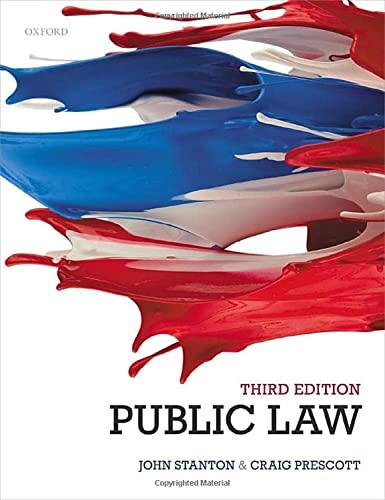Question
Large State University (LSU) is a publicly-funded university in the United States that operates a competitive law school ranked in the Top 100 in the
Large State University ("LSU") is a publicly-funded university in the United States that operates a competitive law school ranked in the Top 100 in the U.S. News rankings. The School's admissions policy proceeds in three steps. In Phase One, the Admissions Committee decides the "automatic admit" and "automatic deny" criteria, establishing two combinations of LSAT and GPA above which applicants are automatically admitted and below which applicants are automatically denied. Traditionally, those criteria weed out (reject) 15% of the applicant pool and pull in (admit) about 10%. The remaining 75% of applicants go forward to Phase Two. In Phase Two, each application is given to three individuals randomly selected from the faculty, a select group of ten alumni, and admissions staff. Each application is scored on a 10-point scale. If the applicant receives a total of 24 points or higher (averaging 8 out of 10 points on each read), the candidate is offered admission. In Phase Three, those applicants who have not been admitted are sent to the Dean of Admissions for one final calculation of "Additional Merit". This involves adding up to six total points to the applicant's score. The categories of additional merit have been described as follows: 1. Legacy Pool (1-2 points). This traditionally goes to children, grandchildren, spouses and other close relatives of alumni. LSU Law believes that all children of alumni deserve a leg up as the School is one large family and family members deserve preference in the admissions process. 2. Dean's Discretion (1-3 points). This traditionally goes to family and friends of highly regarded members of the bench and bar, major donors, and other dignitaries. LSU Law believes that those who are steeped in the tradition of the bench and bar through family may make contributions that exceed their scores on tests. 3. Diversity (1-2 points). This traditionally goes to members of groups that are typically underrepresented in a law school environment. Diversity includes, but is not limited to socio-economic status, life experience, race, ethnicity, or unique circumstances. Members of certain racial and ethnic minority groups are presumed to be included in that group, and automatically receive one point. That grouping includes African-Americans, Hispanics, and Native Americans. LSU Law believes that there is a value in having a critical mass of students from underrepresented backgrounds in the classroom. 4. Scientists and Athletes (1 point maximum). This is a new factor. LSU Law has done a long-term study showing that those who major in fine arts or the physical sciences traditionally score lower on LSATs than other students, but that once admitted to law school, they perform at least as well as all other students.
After awarding points for any "Additional Merit", the Law School makes a final decision on admission, on a rolling basis, starting with the highest scores. Craig Dutton and Deborah Cobb are two white college students who were not admitted to LSU Law. They have sued LSU, claiming that the law school's admissions program is unconstitutional, as a violation of their Equal Protection rights. The University President turns to you and asks you to give more insight on this situation, explaining the constitutional rights involved, the specific case law and principles governing affirmative action in higher education, and your analysis of the likelihood that the suit will succeed or fail.
Step by Step Solution
There are 3 Steps involved in it
Step: 1

Get Instant Access to Expert-Tailored Solutions
See step-by-step solutions with expert insights and AI powered tools for academic success
Step: 2

Step: 3

Ace Your Homework with AI
Get the answers you need in no time with our AI-driven, step-by-step assistance
Get Started


